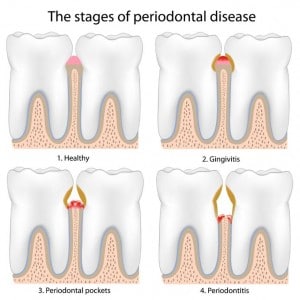What is Periodontal Disease, Also Known as Gum Disease?
Periodontal disease is a condition that develops when bacteria and plaque buildup infect the gums, causing them to pull away from the teeth.
Periodontal disease, more frequently called gum disease, plagues nearly 70 million people in the US. Science continues to discover the associations between periodontal disease and other serious systemic diseases. Most recently, scientists found a link between periodontal disease and faster Alzheimer’s disease progression.
And so, now more than ever, it’s becoming increasingly clear that your oral health affects your entire well-being. That’s why our top Chicago dentists encourage patients to take action to prevent and even reverse a diagnosis of periodontal disease a call to action.
There Are Four Levels of Periodontal Disease.

Level 1 Periodontal Disease (Gingivitis)
The gums around your teeth begin to get infected by dental plaque and bacterial buildup. At this level, patients will often notice periodic bad breath, red and swollen gums, and blood when brushing or flossing. This first level is reversible with regular practice of good dental habits (brushing and flossing), routine checkups, and dental cleanings.
If gingivitis is left untreated, it will progress to:
Level 2 Slight Periodontal Disease
At this point, the bacteria infecting your gums goes deeper affecting more gum tissue and bone. At this point, daily oral hygiene will not halt the further progression of gum disease. Interestingly, the symptoms of the disease at this stage can be silent. While there may be increasing bleeding and swelling, most of these symptoms can go unnoticed. The dentist is the only one who can determine the level of periodontal disease at this point. They will probe your gums, and the depth to which they can go determines if you are at a level 2 gum disease stage or level 3.
Level 3 Moderate Periodontal Disease
The difference between slight and moderate periodontal disease is determined by the depth to which the dentist can probe your gums. If the dentist can probe between 4-5 mm, it’s considered slight periodontal disease. It’s considered moderate periodontal disease if the probing depths are 6-7 mm. At this stage, patients will notice increasing and new symptoms such as teeth shifting, loose teeth, gum recession and sensitivity, and increased bleeding.
Bacteria enter your bloodstream at levels 2 and 3 of periodontal disease, stressing your immune system. At this point, a dental deep cleaning is one of the essential tools in reversing and addressing periodontal disease. If the condition goes untreated, it will progress to:
Level 4 Advanced Periodontal Disease
Advanced periodontal disease leads to tooth loss and dentures; it also increases other systemic diseases. Laser treatment and surgical interventions are necessary for advanced periodontal disease.
Prevention of Periodontal Disease is Key
Regular brushing and flossing are a strong foundation for good oral health. Regular dental checkups and routine cleanings are also part of maintaining a healthy mouth.
Our top Chicago dentists recommend a dental deep cleaning to address any signs of periodontal disease. The procedure involves scaling and root planning. It may require some anesthetic to numb the area. The dentist will remove all the calculus, debris, bacteria, and plaque above and below the gum line. They will also remove bacteria from the root of the tooth. You may also be prescribed an antibiotic as part of the follow-up.
Dental deep cleanings are a powerful and can reverse the early and mid-stages of periodontal disease. Call our office at 773-481-2200 to schedule a consultation if you think you have or have been diagnosed with periodontal disease. You can also schedule your dental consultation online.
